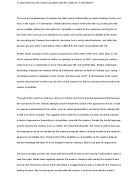To what extent is Frankenstein a criticism of societys attitude to accommodate what it sees as monsters, aliens and exiles?
To what extent is ‘Frankenstein’ a criticism of society’s attitude to accommodate what it sees as monsters, aliens and exiles?
‘Frankenstein’ was written in an era when gothic horror was widely read and very popular, especially with women. Discussing gothic horror was a common past time amongst women and it was acceptable for more unorthodox views to be expressed. Writers knew that mystery and horror were important elements that made up gothic horror which would almost certainly have influenced Shelley’s writing. ‘Frankenstein’ contains many characters which could be seen as monsters, aliens and exiles and Shelley is very particular in the way in which they are portrayed and accepted by society. It appears that in ‘Frankenstein’ society is itself what creates the monsters – after all, the monster only becomes monstrous after being exiled and mistreated by society. This begs the question – is Victor a metaphor for society and how twisted it has become?
Shelley ensures that the audience feels pity for the exiles as they are mistreated. The monster is perhaps the most obvious ‘exile’ and is mistreated in many instances. Firstly by his creator – Frankenstein – which means, in his childlike state, he has no guidance in the world. The first time the monster encounters humans is a jarring way to be introduced to the world of men ‘some attacked me, until, grievously bruised by stones and many other kinds of missile weapons, I escaped to the open country’. The monster, having spent months preparing for the moment, is then cast out by Felix which is perhaps the worst encounter the monster has as even a fellow exile refuses to help him. The family that the monster had so clung to in desperation cannot bear him ‘my heart sunk within me as with bitter sickness’. He then attempts to save a drowning girl and ends up being shot by her companion. Finally as he tries to take William he is rejected once again. ‘If I could seize him, and educate him as my companion and friend, I should not be so desolate in this peopled earth’.








